Dylan Terrell
Founder and Executive Director, Caminos Del Agua
Fellow project website: www.caminosdeagua.org
By weaving together highly economic water collection and filtration innovations, community leadership, bringing in the data and making it accessible to all, and by connecting the fractured actors, Dylan is making safe water available to all. A huge change!
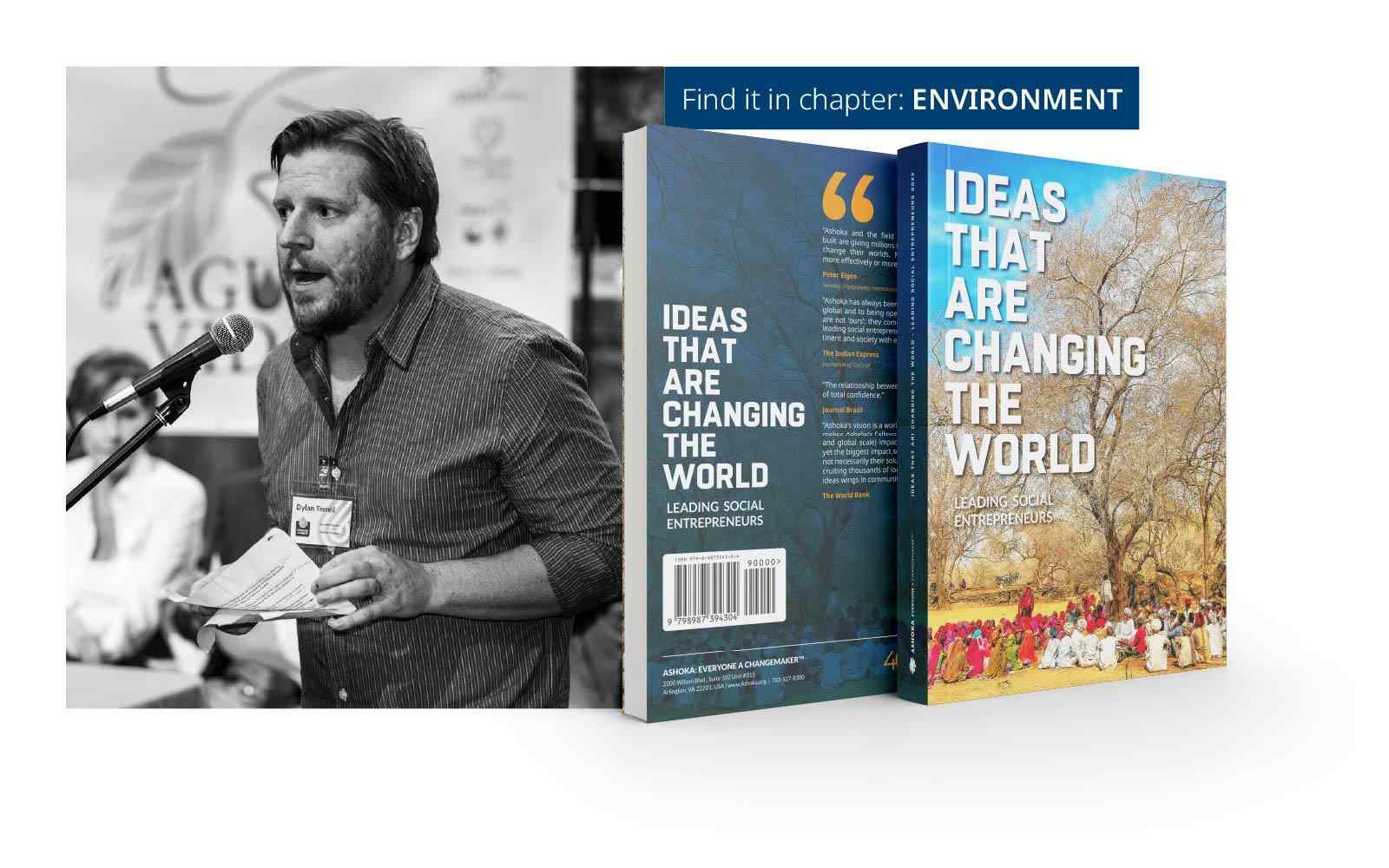
THE NEW IDEA
Dylan uses simple pioneering technologies that deliver affordable, adaptable, and durable solutions to communities suffering from water scarcity in Mexico. These simple and low-cost technologies are implemented through a model in which leadership is held by local communities. Through his organization, Caminos de Agua, Dylan provides both immediate solutions for water-stressed regions, and long-term strategies to address the root causes of water shortages and contamination.
Existent solutions to provide clean water for the challenges facing rural communities in arid regions were both out of reach financially and technically unfit. Big agriculture exporting its products to North America and Europe is responsible for most of the water usage, which means that communities are literally exporting their very precious water resources. To address what has emerged as one of the most urgent environmental and public health issues facing Mexico and other areas with inadequate water supplies, Caminos de Agua develops and delivers low-cost technologies that enable entire communities facing water scarcity to collect and purify water.
Half the Mexican population doesn’t have reliable access to safe water, a giant threat to them and their communities – and to health. Bottled water is too expensive, and many conventional responses don’t work. Dylan has researched and prototyped both technical solutions and successful ways of organizing through local communities. This does work.
Through his wide network of grassroots partners, Dylan trains and involves community members in designing solutions that meet local needs, and which he monitors and evaluates to track progress and improve over the long term. These solutions are then made publicly available – meaning anyone in the world suffering from similar water challenges can use their designs and data to develop their own solutions.
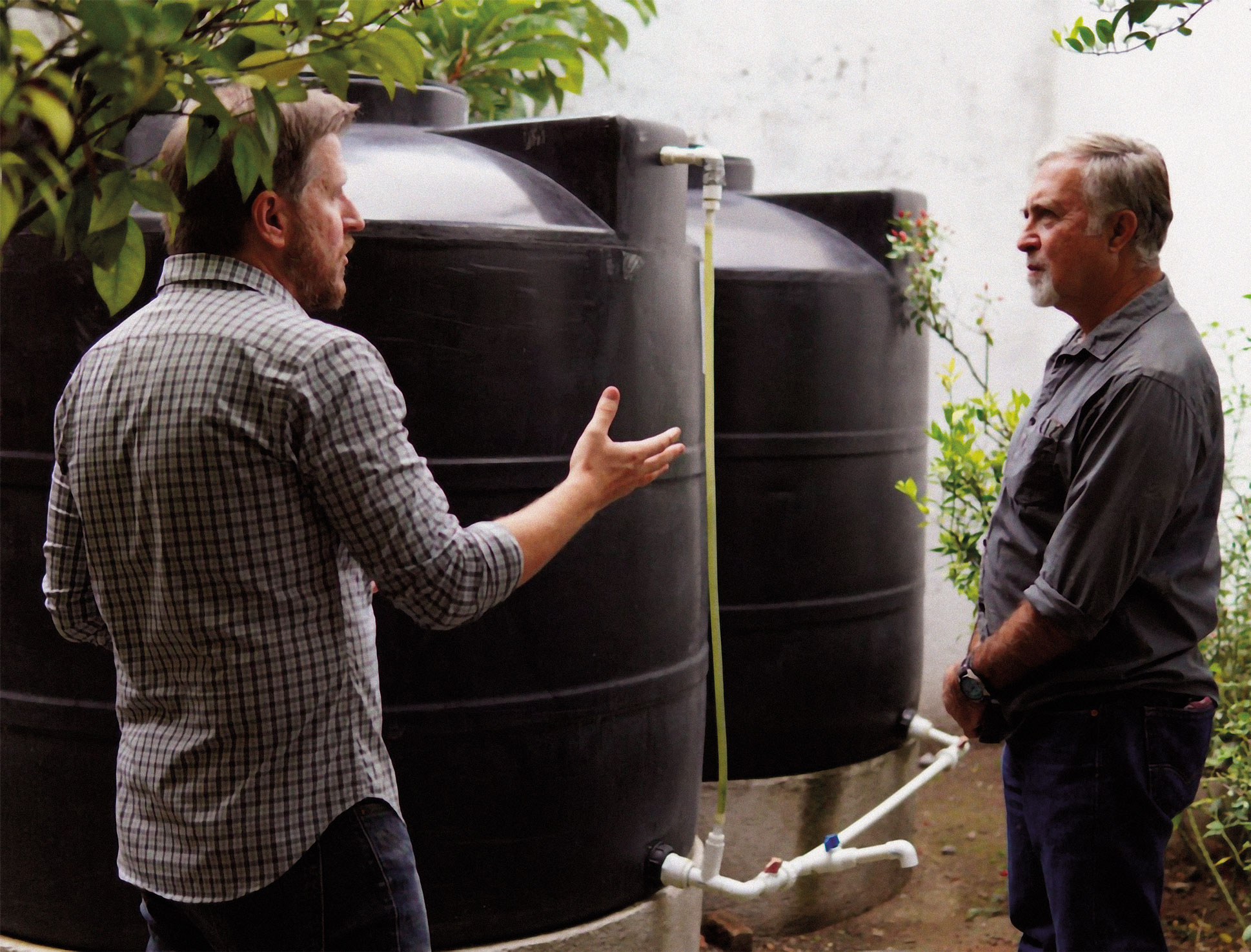
To date, Dylan and his team have developed two main technologies: Aguadapt (a ceramic water filter), and a Groundwater Treatment System (known by its acronym, GTS). Both technologies have received national and international awards, as well as academic recognition. Through their installation in households, Caminos de Agua is creating estimated savings of $220,000 USD per family over the 30-year guaranteed life of the systems.
Caminos de Agua also advances community health and well-being by removing one of the biggest barriers to promoting sustainable management of water resources: the lack of information and transparency regarding water systems and usage. They do this by developing a comprehensive education program for communities, schools, citizen groups, and governments that raises everyone’s understanding of local and global water problems and possibilities. Additionally, they have created low-cost methods to produce more accurate, detailed, and updated data on water issues at community and national levels, and they offer this data openly to ensure informed decision-making by stakeholders across sectors and regions.
Dylan leverages his experience in low-income rural and peri-urban areas that face extreme water stress to influence public policy at the local and national levels, through a variety of strong networks and the vision to create collaborative, systemic solutions. He also works with local and federal level policymakers to improve water management and climate change resiliency and to educate other organizations in the field on how to effectively monitor water quality and replicate their systems that work.
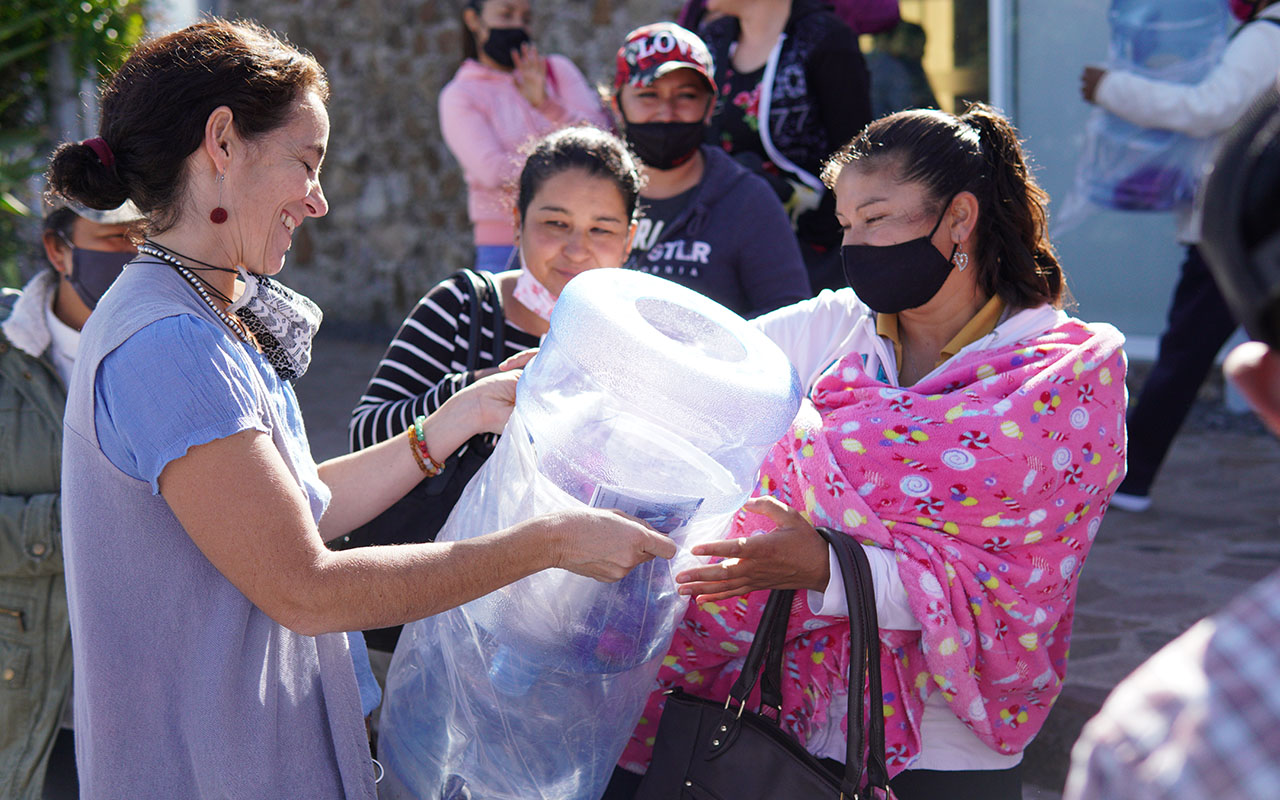
Caminos de Agua is creating estimated savings of $220,000 USD per family over the 30-year guaranteed life of the systems.
In other words, Dylan has now reached the moment when he is beginning to tip the whole system. He’s having this impact because he has the leverage of – uniquely – having brought together his singular combination of state-of-the-art technology, community-led approaches, and collaboration with a multiplicity of partners in a notoriously fragmented sector
THE PROBLEM
In Mexico, 52 percent of the population (67 million people) live with some form of water scarcity. More than 47 million do not have daily or continuous water access, and an estimated 9-11 million have no water service at all.
At the same time, agriculture accounts for over three-fourths of total groundwater usage in Mexico, the second-highest level among OECD countries, with usage continuously increasing. In the state of Guanajuato, for example, over-exploitation by industrial agriculture reduces groundwater levels by two to three meters per year—which is 30 times greater than the eight-centimeter loss per year that qualifies as “extreme water stress”.
The decrease in groundwater levels forces wells ever deeper into the geological substrates, which results in the emergence of dangerous naturally-occurring chemicals in local groundwater supplies, resulting in a serious public health crisis. In Guanajuato, arsenic levels are 22 times higher than World Health Organization recommendations, and fluoride levels are more than 12 times higher. Arsenic and fluoride are closely linked to dental fluorosis, crippling skeletal fluorosis, chronic kidney disease, skin disease, and various cancers. Chemical pollution of the water poses the greatest risk to children, as their growing bodies absorb these minerals at much higher rates, and exposure to high fluoride in utero has severe impacts on children’s cognitive development and learning ability later in life. Globally, 300 million people suffer from excessive levels of arsenic and fluoride in the water supply, with up to 21 million of them living in Mexico. However, due to the lack of adequate water monitoring, the problem is largely unknown and therefore hugely underestimated – – and all too commonly untreated.
Beyond polluting groundwater, over-exploitation causes even the deeper wells to eventually dry up, leaving entire communities without access to water. This forces residents to find water at alternative sources that are often unreliable, expensive, or unsafe, which puts their physical and economic well-being at great risk—especially for women, who are usually responsible for fetching water. This kind of water stress sows the seeds of social conflict. It has contributed to forced displacement within Mexico and around the world. Other ways of getting water often don’t work. Bottled water is too expensive, in water harvesting, and is often insufficient, especially in dry. Dylan believes that this crisis must be faced with both innovative, low-cost short-term solutions that address the current needs of marginalized communities and long-term systemic strategies to tackle increasingly complex water challenges.
THE STRATEGY
Dylan combats water scarcity and contamination in marginalized communities through two parallel strategies: (1) Developing community leadership and low-cost technologies that together provide safe water; and (2) assembling multi-stakeholder collaborations to drive long-term policies and solutions while raising awareness at all levels about local and global water challenges. He supports both strategies with robust monitoring and evaluation systems, which prove the effectiveness of the model in the long term and provide open data to inform systemic solutions.
Dylan’s design and testing work starts with monitoring and mapping water quality and scarcity challenges at the community level. Caminos de Agua partners with grassroots and community organizations that already have a deep understanding of local challenges and can facilitate the work through existing relationships of trust with locals. This broad network allows a birds-eye, yet detailed view of the water situation in communities across Mexico, which enables the network members to identify and direct the right resources toward those most at risk. Once invited to a community, Caminos de Agua implements a participatory process that enables communities to take the lead in designing, building, and maintaining smart water collection and filtering systems. Caminos de Agua then shares its findings on local water quality and explains the available options. If the community decides to take action, they provide technical training, a seven-module educational program, and support to community members in designing and leading projects.
Caminos de Agua uses an unusually collaborative approach in addressing this complex problem: in addition to local communities and grassroots organizations, they have partnered with leading international universities and with Engineers Without Borders to develop appropriate solutions. Through its Technical Fellows program, Caminos de Agua has created pioneering technologies such as Aguadapt (a certified ceramic water filter, used for treating rainwater), and the Groundwater Treatment System. Both are simple and low-cost, utilizing universally available, inexpensive materials so they can be easily replicated in different contexts.
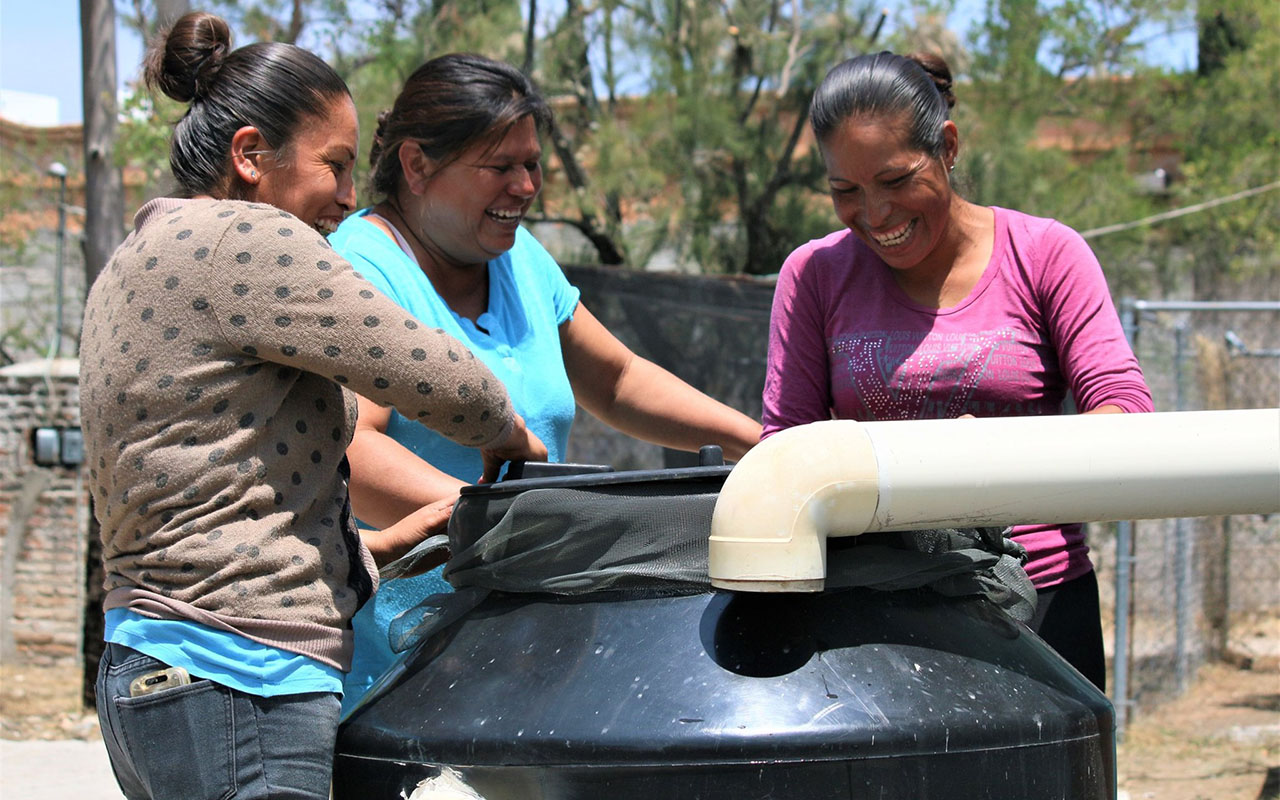
There are times we go one to two weeks without water. I can go down to the river with my daughters when it has water, but when it doesn’t have water, we are all struggling. We are always without water.
Existing low-cost water filters are limited in scope and unable to adjust to the unique water problems and context of each community. Aguadapt is an award-winning, low-cost ceramic water filter that removes 99.9% of all biological contaminants in under five minutes, attaches to universal plumbing, and is easily installed in all common containers, making it ideal for disaster relief. Each filter is about the size of a liter of bottled water but can produce upwards of 30,000 liters of safe drinking water over its four-year life, at a price accessible for a family living on less than $2 USD per day. Most importantly, Aguadapt can be adapted to treat regionally specific organic chemical contaminants that disproportionately affect low-income communities around the world. This adaptability lowers costs by avoiding overengineering to remove contaminants that do not exist locally. As chemicals are poised to become the world’s most serious water contamination challenge, Aguadapt is the first low-cost technology designed to be flexible enough to tackle the problem in any context. To date, more than 7,000 Aguadapts have been distributed through citizen sector partners across Mexico, impacting more than 11,600 people. These filters are also used in Caminos de Agua’s rainwater harvesting systems, which have created more than 3.2 million liters of rainwater storage capacity and 125 million liters of filtering capacity in 68 communities and 30 schools throughout Mexico.
Dylan has also developed the Groundwater Treatment System (from now on, GTS) together with Technical Fellows from leading universities, to remove arsenic and fluoride from contaminated community water supplies at a very low cost—the first such tool in the world. For roughly the same initial cost of one rainwater harvesting system that would only serve one to two families, and 100 times cheaper than buying water, a GTS can be installed to provide clean safe drinking water for up to 15 families in a community. After directing contaminated water to an elevated storage tank, the contaminated water passes through a series of filters to remove sediment, arsenic, fluoride and biological pathogens, and is distributed to the system. Unlike commercial options, the GTS does not require electricity, does not waste any water, and can be designed and adapted to address a given population’s needs, size, and levels of arsenic and fluoride.
After a successful year-long trial, Caminos de Agua is in the midst of the first full-scale pilot system trial in a rural community that faces water deprivation and excessive levels of arsenic and fluoride contamination. In this community, the GTS is already providing 300 liters of drinking water per day to ten households. Dylan and his team are currently in talks with the State Health Secretary of Guanajuato to roll the system out statewide once the pilot is concluded.
By empowering communities and local partners to co-lead solutions from day one, Caminos de Agua has achieved exceptional levels of sustainability. Involving communities at each step—rather than installing pre-made, top-down solutions—fosters ownership and builds local capacity to maintain the systems. For example, follow-up research on rainwater harvesting systems installed in 2018 showed that 100 percent of households were using the systems and around 90 percent were correctly maintaining them. This participatory approach promotes sustainable behaviors as community members become more aware of the quality of the water they drink.
Long-term monitoring and evaluation have shown concrete results around Mexico. In community after community children born after the installation of rainwater harvesting and filtering systems no longer suffer from the severe stomach pain and dental fluorosis that were prevalent before. Caminos de Agua has eliminated arsenic and fluoride-contaminated water consumption in impacted communities and increased overall water access by 26%, with all families reporting sufficient water for drinking and cooking. As a result, 92%of households have lowered their annual spending on potable water from 22% of their income on average to less than 2%, creating estimated savings of $220,000 USD per family over the 30-year guaranteed life of the systems. These interventions also encourage social cohesion as a result of both of the collaborative approach and the reduction of conflict due to water scarcity. Community members report closer relationships with their neighbors, which has led to other community-based projects.
As well as developing and implementing technical solutions for the short and medium term, Dylan is tackling the systemic causes of water issues by promoting education, building networks, and improving access to data to influence policies and strategies at the national level. To raise awareness about modern water quality challenges, Caminos de Agua provides its educational program and materials to communities, citizen groups, schools, and government agencies. All of the materials created by the organization are available to the public through its website. They have also developed international university-accredited courses, and function as a “field school” that prepares young aspiring engineers to be socially responsible professionals. So far, 29 “Technical Fellows” from Mexico and eight other countries have spent six months to a year gaining the hands-on technical, social, and political experience necessary to lead systemic solutions to water-related problems.
Prosperous Mexican Farmers Suck Up Water, Leaving Villages High and Dry. “As far back as the 1980s, even before NAFTA, the government imposed a ban on most new wells in Guanajuato. But water extraction increased exponentially. What allowed that to happen is “a pretty well-known system of bribes and corruption,” Mr. Terrell said.” - THE NEW YORK TIMES
Dylan has improved the general understanding of water issues by providing rich, open-source data that the government can use to make policy decisions and that citizens can use to hold authorities and industries accountable. By leveraging their network of grassroots partners, they continuously monitor water quality, scarcity, access, cost, and conflicts on the ground at over 600 sites. In one municipality of Guanajuato, a study of all the local wells ultimately pushed the administration to build 100 large-scale rainwater harvesting systems and treatment plants in the most impacted communities. At the state level, they work with the Department of Environment and Sustainability to provide an extensive monitoring and evaluation program of the state’s own rainwater harvesting projects. Caminos de Agua then aggregates its own data with that from other organizations, institutions, and the government and makes it available in a free interactive map that can be easily accessed and understood by the general public.
Convinced that increasing citizens’ understanding of water issues is essential to drive bottom-up solutions, Dylan engages strategic partners to develop mechanisms for communities to produce their own, contextually relevant data independently and make it easily available to all.
To scale his impact, Dylan is focusing on engaging and mobilizing multi-sector partnerships from the local to international levels to co-create systemic solutions. He has joined the National Inventory on Water Quality Network where he works with academic institutions and civil society organizations to extend his map of water quality issues (especially arsenic and fluoride pollution) to other regions of the country. Further, Caminos de Agua has become one of the few CSO members with voting power on the National Consultative Council for Water, where they influence federal policies. In Guanajuato, Dylan spearheaded a new coalition of 14 local CSOs, the Agua Vida Network, to promote a coordinated and unified voice in the battle for healthy potable water in the region. Together, they successfully influenced the government of San Miguel de Allende to turn it into the first city in all of Mexico to require the installation of rainwater harvesting systems in all future housing and commercial developments.
Now, Dylan is focused on building high-impact collaborative networks and influencing policies to raise awareness and address the systemic issues at the root of the problem, especially restoring watersheds, increasing groundwater infiltration, limiting consumption by water abusers, promoting reforestation, and pushing citizens and industry alike to invest in water conservation and capture for the good of all.
Moving forward, Dylan seeks to bring Caminos de Agua’s approach and technologies to more communities in Mexico and beyond. He is considering forming a subsidiary (fully owned by the nonprofit) to manufacture and market their solutions, particularly to other CSOs as well as to governments, which would enable them both to scale and to generate an income stream to reinvest in the organization. He also plans on partnering with municipal and state governments to provide the Groundwater Treatment Systems as an ongoing service business. While in previous years his organization has grown slowly due to the intensive research and prototype development work, they now have the infrastructure and concrete solutions to rapidly increase their impact exponentially.
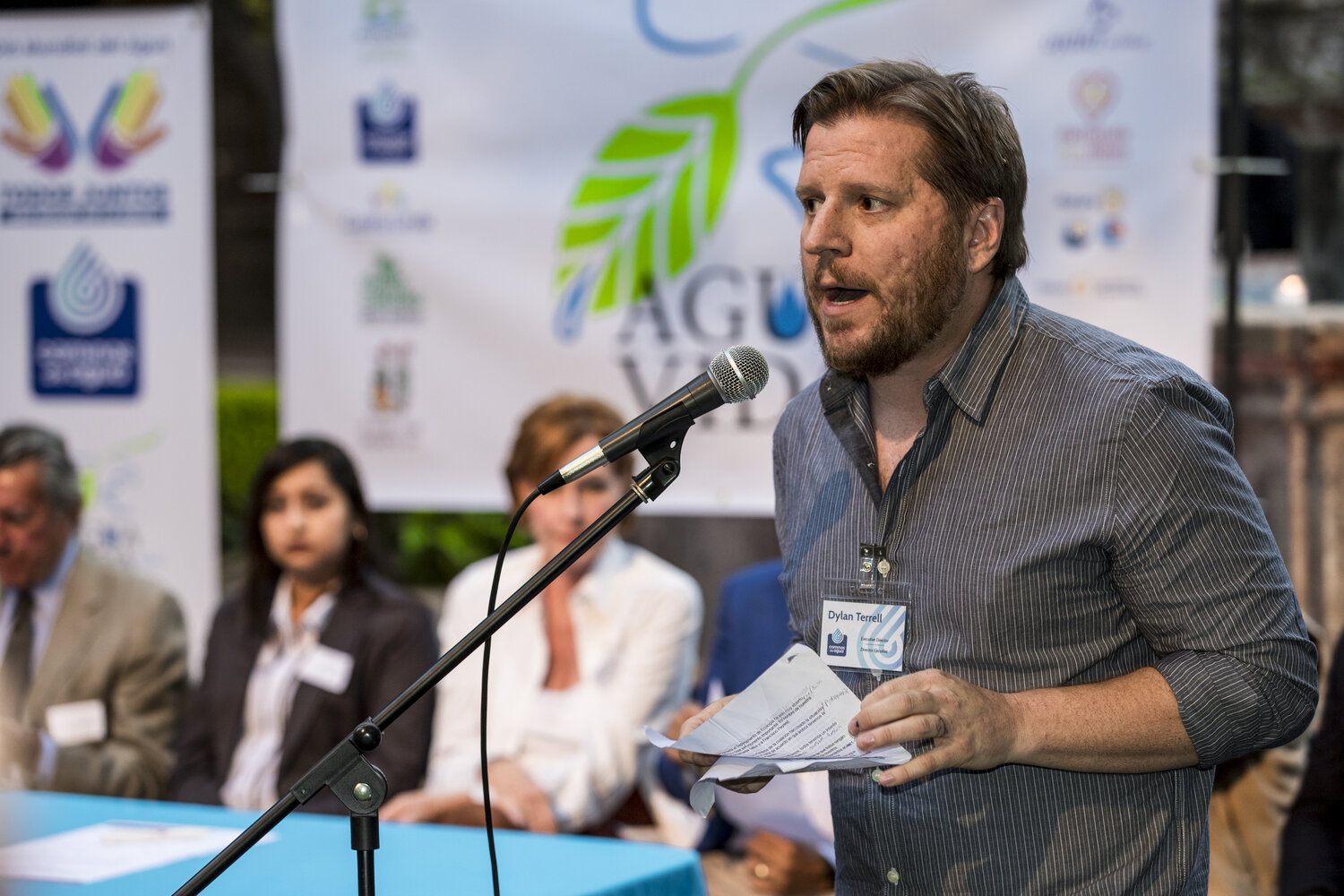
THE PERSON
Dylan grew up in the United States in a family that greatly emphasized working to create a better world for everyone. He volunteered with his grandparents’ community organization from a young age, where he was exposed to diverse social problems ranging from immigration to housing. He is constantly inspired by his grandfather’s words: “If you’re not finding a way to help improve the lives of real people, every day, then you’re missing the point.” This ethos has helped him to take risks and make difficult choices to continue serving others, even when it meant going against the tide.
At 17 years old, Dylan took an unusual path before starting college: he traveled to Guatemala to volunteer and learn about the country. He became enamored with Latin America but was struck by the rampant inequality throughout the region. This stop became the first of several Latin American countries where he would later live and work in. While working in an orphanage in Peru, he became passionate about promoting sustainable development and decided to pursue a master’s in Global Sustainability and Rural Development. During his master’s program in Colorado, his work with a grassroots nonprofit took him to Chiapas to work with indigenous communities on social development projects. However, in splitting time between Mexico and the U.S., he grew frustrated by the lack of effective and deep impact over his short visits.
That is why, after meeting like-minded people in Guanajuato, he decided to build up a new project to develop solutions based on real community needs. From day one, he fully committed to the work by moving permanently to live in Mexico. Initially, the aim of his organization was to respond to local issues with sustainable technologies, training, and support. But it was through partnering with—and listening to the needs of—local communities and grassroots organizations that he understood water scarcity and contamination as the most urgent problems in the region and decided to launch Caminos de Agua.